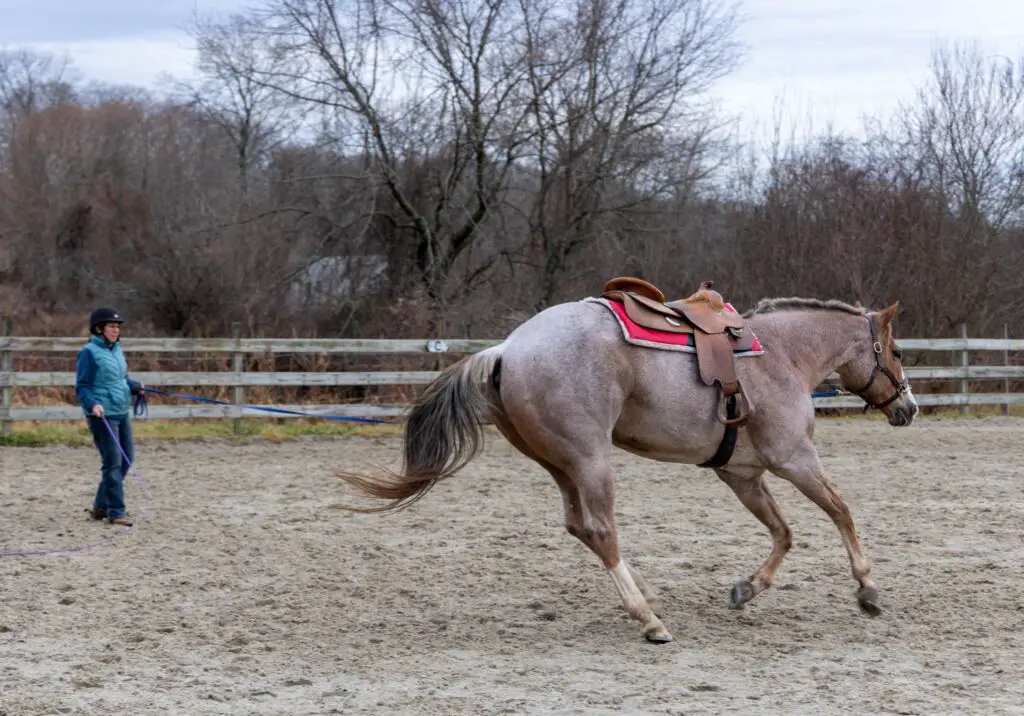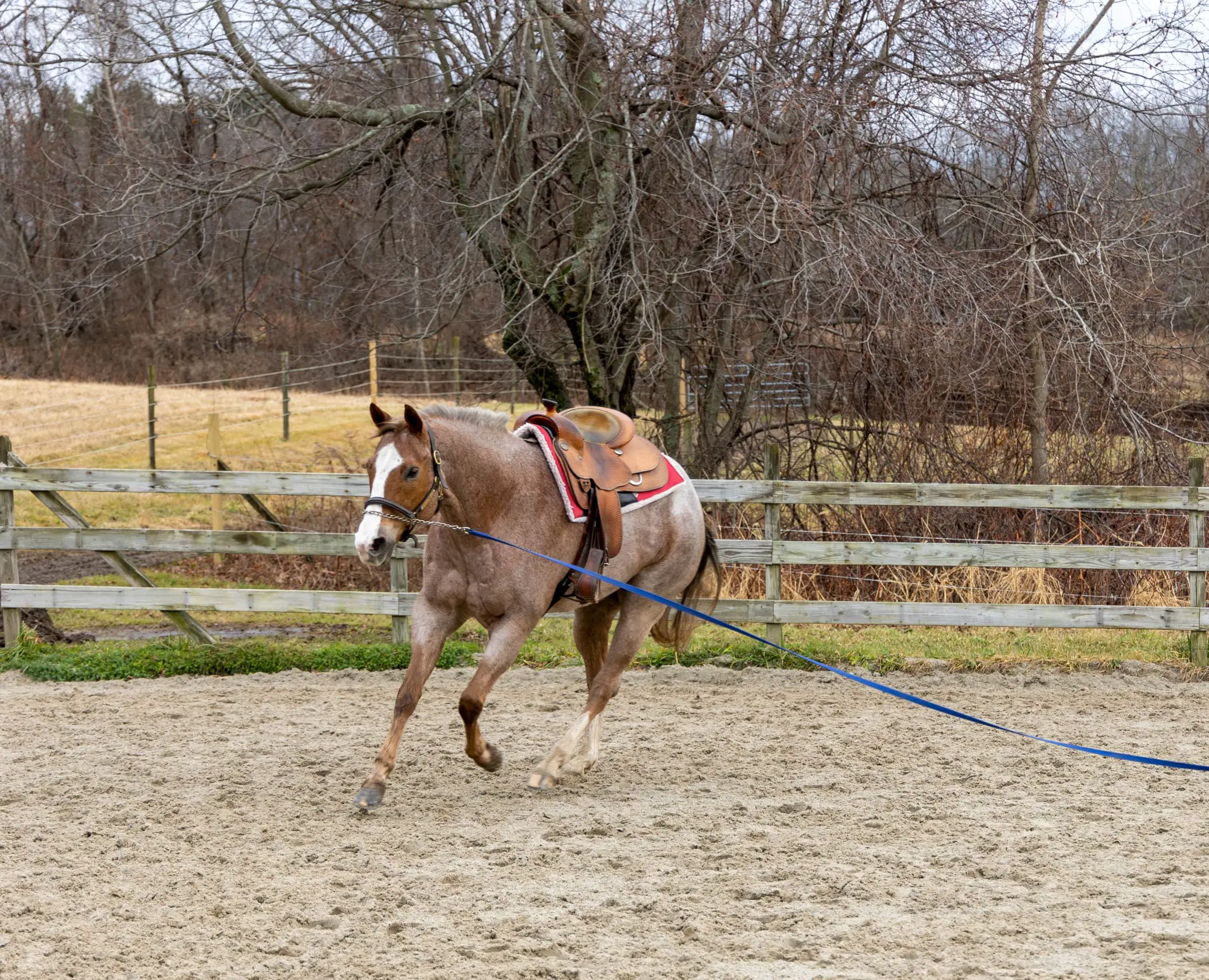It can be tough to decide whether or not you need to lunge your horse before you ride. Or, if they will be ready to focus. Knowing when you should lunge your horse or not is important for your safety as a rider. When in doubt consider the following questions to help you decide.
As a general rule, its a good idea to lunge your horse before you ride if you are uncertain about how they will react or their energy level is high. Lunging is a great way to help your horse stretch, warm-up and drain some energy prior to riding. The rider should always assess their horse’s body language, age and personality before mounting. For horses that have soundness issues or have recently recovered from an injury, lunging can help the rider determine if the horse is sound prior to riding as well. If your horse does not fit into one of the aforementioned categories, it may be better not to lunge your horse. Lunging excessively can lead to other problems such as unsoundness and a higher level of fitness than is desired.
Follow this guide to help you decide whether lunging is necessary for your horse.
Reasons You Should Lunge Your Horse Before You Ride
To make a responsible decision you’ll need to analyze many factors. And, as a novice equestrian or horse owner, it’s always a good idea to consult your trainer. You and your trainer should consider the following.
Need to find a good trainer to help you? Check out this article!
How To Find A Riding Instructor And What To Look Out For
Your Horse Has Had Time Off
Typically when one of my horses has had a couple of days off due to either the weather or my schedule I will give them a brief lunge. Our horses are in regular work so they tend to know their routine and we try not to over work them. Some of our younger horses require a quick lunge before riding if they have even had one day off just to help them relax so that we are not asking them to concentrate before they’ve had a chance to settle in.
If your horse has had several days off you may need to lunge longer. Don’t try to time the amount of lunging your horse needs based on your watch.
The Weather Recently Changed
We’ve all seen the funny memes floating around on social media about how horses behave when the weather turns in the fall. Unfortunately, while they are funny, many of the scenarios we see are true and often times novice riders are caught off guard.
It’s a beautiful sunny day, the temperature has hit a nice mild 55 degrees and there is a gentle breeze. And all of a sudden your horse has turned into a kite, flying away in the wind. The equipment in the arena has all of a sudden turned into the boogie man and you are stuck hoping and praying neither you or your horse gets hurt. This is the time to lunge!
Your Horse Is Highly Reactive, Alert Or Green
Reading your horse’s body language correctly is the key here. If your horse is alert, ears forward, neck stretched up high, nostrils flaring and looking around, this is a sign that you need to lunge. Is your horse turning their nose away from you to look around while pushing into you with their shoulder? Spooking or seems like they’re about to spook? Time to lunge!
If your horse is young or green but seems quiet and is not alert you may not need to lunge. However, many riders choose to lunge their young or green horses for a few minutes just to check in. Its helpful to see what type of mood your horse is in before mounting. This is a good idea since we don’t always know how a young or green horse will react. As the horse progresses and the rider gets to know their personality, they start to decrease the frequency of lunging before riding.

Your Horse Has A Soundness Issue
Lunging can be beneficial if your horse is recovering or has recently healed from an injury. It can also be helpful if he or she has a chronic soundness issue like arthritis. Lunging is a good opportunity for you to evaluate your horse’s soundness. Then you can make sure they are ok to ride and feeling up to it. Even if one of my horses simply throws a shoe and gets it put back on right away. I’ll lunge for a few minutes to make sure my horse is sound before riding.
In this instance lunging isn’t to tire your horse out but simply to evaluate their comfort level. If you’re lunging to check for soundness, start slow and give your horse a few minutes to warm. Avoid asking them to do anything difficult or strenuous from the get go. You’ll also want to make sure your lunge circle is large enough that you don’t cause your horse discomfort.
You Are Riding In A New Environment
Taking your horse to a new arena, horse show or off site trail ride for the first time can be a little intimidating! Even if your horse is a pro. Whether you’re on an old school master or an inexperienced green horse lunging before riding in a new environment can help relieve the jitters.
Lunging in new places is beneficial for many reasons! First it allows your horse to become acclimated to their new surroundings before you ride. Secondly, if you trailered your horse they’ll have a moment to stretch and work out any kinks from traveling. Many horses become alert and active due to adrenaline when they are exposed to a new place. So, lunging can help them drain some energy become calm before you ride.
Reasons You Should Not Lunge Your Horse Before You Ride
Based on your horse’s soundness and normal routine, lunging may not be necessary. Below are some reasons you may decide NOT to lunge your horse before riding.
There Is No Change To Your Horse’s Normal Routine
If your horse is in a consistent program and does receives plenty of exercise and turn-out throughout the week, there is likely no reason to lunge. For example, if the weather has not changed, your horse hasn’t had a day off and they’ve had other outlets like playing with friends to blow off steam or they don’t tend to be stiff lunging may be somewhat pointless.
If your intent is to work with your horse on the ground and not necessarily to warm up or drain energy, try doing some other ground work exercises instead. You can always work on showmanship, leading, yielding your horse’s hip and more.
Your Horse Is Too Fit To Lunge Before You Ride
Having a highly fit and athletic horse is not always a good problem to have! If your horse is fit, try not to make a habit of lunging. Instead, only lunge your horse when you really need to! The problem is, lunging your horse frequently and also riding them will just make them stronger. This may be to your advantage depending on what you’re asking your horse to do. However, if you decide to take your horse to a show and want to lunge to help them acclimate to their new surroundings, they may require a very long time to drain energy. Or, they may not even tire out at all!
When I have a horse that is too fit but is also green and not trustworthy, I try to do two things. The first thing I do is give them an extra day off during the week. The second thing I do is wean them off of lunging. For example, I may start by lunging for less time and then see how they feel under saddle. If that is successful I will try to skip lunging one day if they had a good ride the day before.
Another way I handle getting my horse’s attention when I don’t want to lunge is to do some ground work like leading exercises before mounting instead. This way I can evaluate their body language and get them focused before I mount but without raising their heart rate.
Your Horse Has A Health Issue That Makes Lunging Unsafe
Lunging is a great tool however, riders need to be careful! Asking your horse to work on a tight circle puts uneven pressure on their joints and hooves. That’s not to say circling is bad but everything in moderation! If your horse has ever had a soundness issue with their stifle or a disease like Navicular, your vet may advise you not to lunge your horse before you ride or at all!
Or, your vet may give you guidelines on how to lunge safely and the amount of time that is ok to lunge.
If you have any concerns about your horse’s health and soundness, you should definitely check with your veterinarian about the types of exercise you and your horse do!

I hope you found this article helpful! If you did, please give it a share!

